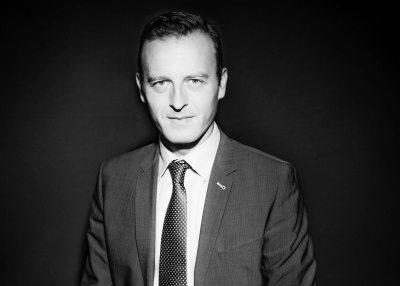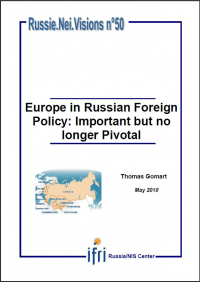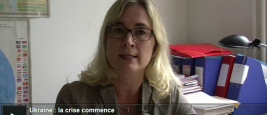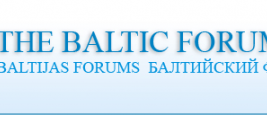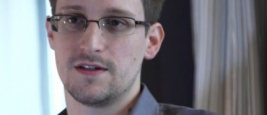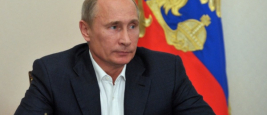Thomas GOMART
Director of Ifri
Research Interests:
- International relations
- Post-Soviet space
- French diplomacy
- Energy issues
- Digital gouvernance
- Geopolitics and security
.
Thomas Gomart was appointed Director of the French Institute of International Relations - Ifri after serving as Director of strategic development from 2010 to 2015 and founding and directing Ifri’s Russia / NIS Center from 2004 to 2013. Thomas Gomart holds a PhD in the History of International Relations from Paris I Panthéon-Sorbonne and an EMBA from HEC (Paris). Prior to joining Ifri, Thomas Gomart worked at Marne-la-Vallée University (1996-1999) and for the French Ministry of Defense. He has also been Lavoisier Fellow at the State Institute of international relations (MGIMO – Moscow, 2001), Visiting Fellow at the Institute of Security Studies (European Union – Paris, 2002), and Marie Curie Fellow at the Department of War Studies (King’s College – London, 2003).
As a researcher, he focuses on digital governance, country risk, Russia, and think tanks. He recently published Notre intérêt national. Quelle politique étrangère pour la France? (ed., with Thierry de Montbrial), Editions Odile Jacob, 2017; L’affolement du monde - 10 enjeux géopolitiques, Editions Tallandier, 2019 (Awarded the Prix Louis Marin and Prix du Livre de Géopolitique); “What Is A Think Tank? A French Perspective”, Etudes de l'Ifri, November 2019; « Le COVID-19 et la fin de l'innocence technologique », Politique étrangère, vol. 85, n° 2, Summer 2020; Guerres Invisibles. Nos prochains défis géopolitiques, Editions Tallandier, 2021 and Les ambitions inavouées. Ce que préparent les grandes puissances, Editions Tallandier, 2023.
This book provides an original and thoroughly academic analysis of the link between Russian energy and foreign policies in Eurasia, as well as offering an interpretation of Russia's coherence on the international stage, seeking to understand Russia and explain its behaviour.
...These three chapters originated in an SSI conference in January 2010 and go to the heart of a question of vital significance for both Asia and Russia, namely, what are Russia's prospects in Asia? The three papers outline the challenges Russia faces in Asia, the nature of the dynamic and...
It is now necessary to ask ourselves what place Europe holds in Russian foreign policy, given the recent developments in the latter. Indeed, Europe is by far Russia's most important partner. Nevertheless, Russia is developing a discourse of emerging state, in order to highlight the rapid loss...
"This volume is a most timely and useful contribution to the literature on contemporary Russia and its neighborhood. Thomas Gomart and Tatiana Kastueva-Jean have brought together a fine team of established and young scholars to discuss some of the most critical domestic and foreign policy...
'This perceptive and well-informed study highlights the continuity of the Russian (civilian and military) security community's distrust of the outside world, fueled by NATO enlargement. Communism may be dead in Russia, but the obsession with ‘threats' continues, rallying the population and...
The CSIS/IFRI joint project seeks to reframe the trilateral relationship for the relevant policymaking communities. We are motivated with the possibility that new opportunities may be emerging with leadership change in Moscow and Washington. In particular, we hope that our analyses and...
In this year's collection from Ifri's Russia/NIS Center, four themes are explored: the EU-Russia relationship, the strategies of Russia's national champions, Russian foreign policy, and energy and strategy dimensions in Russian bilateral relations. "Any publication on Russia to be released in...
Il y aura un avant et un après. En Ukraine, en Russie, dans toute l’Europe, ailleurs.
...Significant changes in global and regional energy supply and demand, as well as their influence on the political decision-making determine the need to restore proper expert analysis of problems and development perspectives.
...Why did Edward Snowden decide to disclose information related to U.S. secret services?
...
Since December 2011 there is a real convergence between the perception of President Vladimir Putin and the perception of Russia, especially, in the Western media.
...What are, in your opinion, his main successes during these 60 years?
...
How do you assess the Russian internet, in general? Is it different from the English web or not, in political terms?
...
Which country can Russia consider as a partner and a friend, if such country exists?
...BRUSSELS — Russia said Thursday that it might pledge up to $20 billion via the International Monetary Fund to help stabilize the euro, highlighting the effects of the sovereign debt crisis on Europe’s global influence.
...


